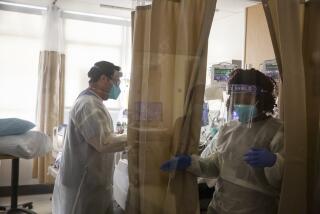More sleep for residents is urged
Reforms imposed five years ago to rein in the long work hours put in by doctors in training don’t go far enough to reduce risks to both patients and sleep-deprived trainees, according to a report released Tuesday.
The report, produced by the Institute of Medicine, an arm of the National Academies, recommended that medical residents ideally should work no longer than 16 consecutive hours, considerably less than the 30-hour shifts now allowed.
If they have to go longer than 16 hours, they should be required to take a five-hour nap, which would count toward a maximum 30-hour cap.
The institute also recommended that any hours spent moonlighting should count against the maximum 80 work hours allowed per week (averaged over four weeks). That could eliminate a popular practice for residents, who make about $40,000 a year and are often burdened with large educational loans.
Dr. L. Toni Lewis, who recently completed a residency in family practice and now heads a union representing residents in five states, called the report “historic.”
“We’re really excited that they’re focusing so much on the 16-hour work limit,” she said. “And [the report] addresses not just the hours but the quality of resident education and patient care.”
But others viewed the recommendations as still too weak. Dr. Peter Lurie of the consumer advocacy group Public Citizen said the mandated five-hour nap was just a ruse to make sure residents could still work a 30-hour shift.
“No one is going to get anything approaching five hours of sleep,” Lurie said. “It’s just an elaborate effort to keep alive the current guidelines while requiring organized medicine to make as few changes as possible.”
Residents -- so called because in the late 1800s, they actually lived in hospitals -- are medical school graduates who care for patients under the supervision of experienced physicians.
A form of apprenticeship, residency has long been notorious for brutal hours and minimal pay. Residency can last three to seven years, depending on the specialization.
The move to limit those hours began in 1984 with the much-publicized death of Libby Zion shortly after she was admitted to a New York hospital. Her father, a well-known lawyer and journalist, became convinced that the 18-year-old died because the residents on duty that night were working 36-hour shifts and caring for too many patients.
In recent years, studies have shown that residents who go too long without sleep are more likely to injure themselves and others through needle sticks or car accidents.
New York hospitals first imposed 80-hour work weeks in 1989. After Congress threatened to intervene, the Accreditation Council for Graduate Medical Education in 2003 made it a condition of accreditation.
But the 80-hour restriction has been expensive for hospitals, which have had to hire more residents to make up for the lost hours.
The new recommendations would add even more costs. Hiring additional staff to allow residents to work shorter shifts would cost about $1.7 billion annually, according to the medical experts who prepared the institute’s report.
“We believe that the additional $1.7 billion a year is a necessary investment in patient safety and better healthcare outcomes,” said Dr. Michael M.E. Johns, the panel’s chairman and chancellor of Emory University in Atlanta. “The science clearly shows that fatigue increases the chances of errors, and residents often work long hours without rest and regular time off.”
Saying that reducing hours alone would not improve doctor training or patient safety, the report also proposed protocols to improve “handoffs” of patients from one resident to another during shift changes, a period notorious for introducing errors.
It also called for closer supervision of residents by fully licensed physicians and warned against merely expecting residents to take care of the same number of patients over a shorter period of time.
Dr. Mark I. Langdorf, medical director of the emergency department at UC Irvine Medical Center and associate director of the residency program, called the recommendations “nuts.”
“The problem here is balancing the need for patient safety, which I acknowledge, with the need to have the training in medicine be an apprenticeship,” he said. “It sells the educational process short to make training so intermittent that you don’t really get continuity.”
Langdorf also said that any advantage of working shorter shifts is outweighed by the disadvantage of having to turn over patient care to doctors who don’t know the patient’s history, particularly given the lack of computerized patient records.
One of the report’s strengths is that it calls for monitoring both the five-hour naps and the increased handoffs for unintended consequences, said Dr. Christopher Landrigan, a professor of pediatrics at Harvard Medical School who has conducted research on residents and sleep.
“There’s no question that there’s still a large cohort of doctors who do think that these 30-hour shifts are essential,” Landrigan said. “But there are a growing number of doctors who accept that sleep deprivation plays a role in patient safety. There’s been a real shift in the culture in the last five years.”
--
More to Read
Sign up for Essential California
The most important California stories and recommendations in your inbox every morning.
You may occasionally receive promotional content from the Los Angeles Times.










